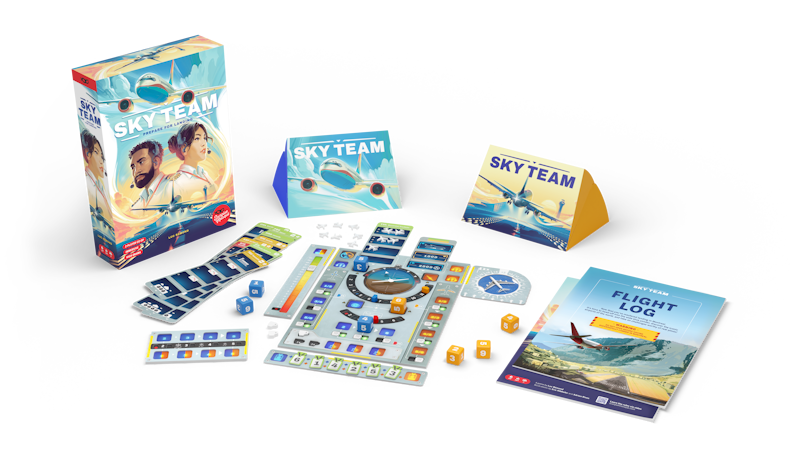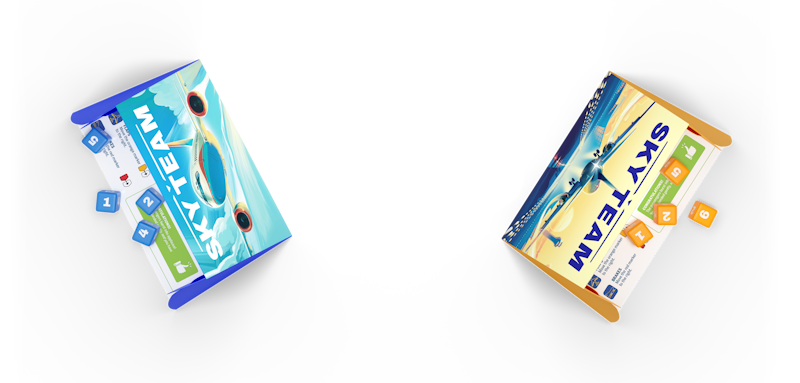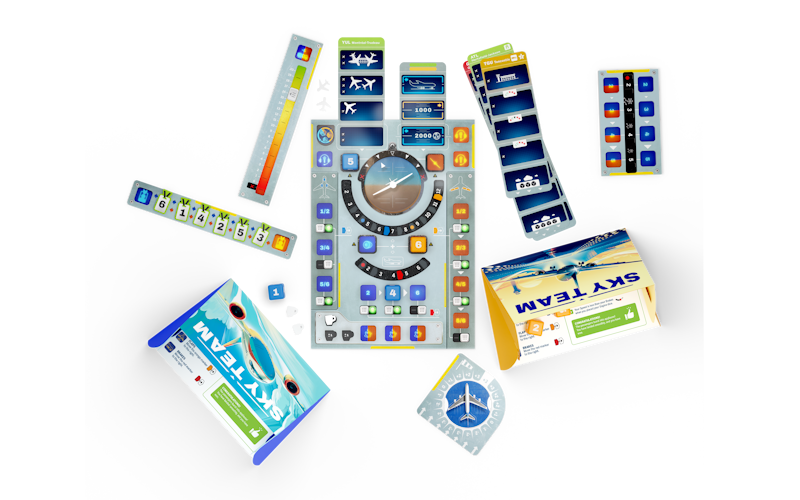Sky Team
review by Alapai
Sky Team is an asymmetric 2-player cooperative game from Scorpion Masqué. In it, you play as copilots trying to land an airplane at an airport. To do so though, you have to place dice on the control panel with your partner, not communicating from the point when the dice have been rolled behind your screen until the next round.

A game of Sky Team is played through a number of rounds as you descend through the sky towards your destination. At the beginning of a round, before you roll any dice, you discuss what goals you want to achieve during the round without talking directly about the dice (aka no saying that “if you get a 5, put it here”). Then, you roll the 4 dice for your color behind your screen and are no longer allowed to communicate until the next round. During the round, you will take turns placing the rolled dice at different locations on the control panel. 2 of your dice each round have to be placed at specific locations, but the other two can be played wherever you think is most useful. The Axis space is mandatory and determines at what angle your plane is tilted. Once both players play a die to their respective Axis space, the plane will tilt in the direction of the higher number a number of notches equal to the difference between the two numbers. If it tilts too heavily, the plane spins out and you lose the game. The Engine space is the other mandatory space and determines how quickly the terminal is approaching. Once both players play a die in their respective Engine space, you add the numbers together and compare the value to the landing gear and flaps indicators to see how many spaces you move towards the terminal (0, 1 or 2). If you overshoot the terminal, you lose the game. The Radio spaces moves airplanes in your flight path away. If there are airplanes in your current location and the Engines move you forward, you crash and lose the game. The Landing Gear spaces are for the blue player only and placing a die on a Landing Gear space moves its indicator up a space, making it easier to slow the plane down. The Flaps are for the orange player only and placing a die on a Flaps space moves its indicator up a space, also making it easier to slow the plane down. The Concentration spaces give your team coffee tokens that you can spend to modify die results. The Brakes spaces are for the blue player only and placing a die there moves its indicator to make the final landing easier the higher the indicator. At the end of each round, you move the altitude track down one space. If it moves to the last space, then, as long as you are at the terminal, you enter the final round. In this round, the Engine space acts differently, comparing the combined blue and orange die totals to the Brakes value. If the Brakes value is higher, then you’ve successfully stopped the plane. In order to win the game, you need the plane to be horizontal, not tilting to either side, the Engine value to be less than the Brakes value, no airplanes in the way and to have engaged every Landing Gear and Flaps space. If you do so, then you have successfully landed the plane and won the game!

Like with Under Falling Skies, another dice game I enjoy that I’ve reviewed prior, Sky Team has a basic game that you play through first, with additional challenges and setups in the box separately. While I enjoy the basic game of Sky Team, purchasing it also gives you much more content, essentially being both a base game and expansions all rolled into one. Some of these include challenges like having to tilt your plane at certain spaces to avoid crashing, training an intern who is incredibly helpful, but also requires being trained fully by the end of the game or having to place your dice each round within 60 seconds. All in all, there are 21 different scenarios, ranked on a difficulty scale of Green-Yellow-Red-Black.

If you had spoken with me a few years ago, I probably would have dismissed Sky Team outright. Not only is it a dice game, which I was opposed to, but it was a cooperative game, which I’m also opposed to. Having gained some experiences with other games, I’ve developed more of an appreciation for some dice games and cooperative games. Sky Team, I’m happy to say, does not have the problems that make me dislike dice games or cooperative games. I dislike some dice games (a lot of older dice games) as they often rely very heavily on luck. While I generally want some amount of luck in the games I play, there are plenty of games where you can roll poorly and therefore lose. With Sky Team, no matter what I roll on any given turn, it’s up to me to place the dice most effectively. The dice themselves are only good or bad if my partner doesn’t match up with what my plans are for the Axis and Engine, because I can always use the other dice in different ways to help out. And speaking of my partner, the main thing I dislike about cooperative games is when one person decides that instead of a multiplayer game with each player making their own decisions to help out, it’s better if they make all the decisions. So if you’re playing a game of Flash Point: Fire Rescue, instead of making your own decision about how your character takes their turn, the person who thinks they know best decides what they do and what you do and what everybody does. A bossy person can turn a cooperative game into a solo game by taking away everybody else’s agency. With Sky Team, since there is hidden information as well as no communication, both players have their own agency in the game. While a bossy person can make suggestions as to what to do, there is only so much they can do to affect what you do on your turn. You have to decide which dice you want to use for the Axis and Engine and how best you can utilize your other 2 dice.
One thing I also want to mention is the initial set-up. With a lot of games, there is often punching pieces out or cardboard, but with Sky Team, it is a bit more involved, where you have to punch a lot of pieces out of the Control Panel to fit where the dice, markers and switches go, as well as utilize the double-sided tape to stick the two parts of the Control Panel together. I normally wouldn’t mention the set-up, but punching 48 pieces out of the Control Panel and having to attach the parts together is a bit more involved. While you probably should generally allocate a small amount of time before your first time in any game to getting the components ready, Sky Team is just a little more involved than most.
If you’re looking for a 2-player, cooperative game, Sky Team provides a fun, yet challenging experience that has a large variety of options.
Sky Team is available now from our webstore.
